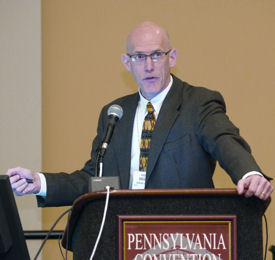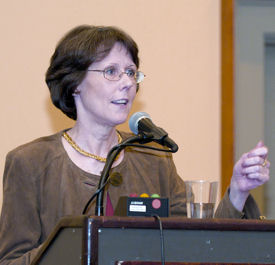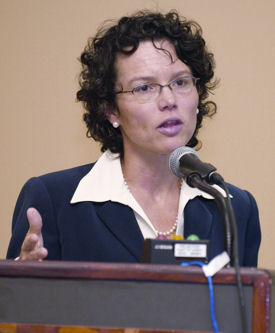Correcting myths about pneumococcus, flu, zoster vaccines
Vaccines have an undeserved bad reputation, so a Master of the College promotes their use and discusses common errors in administration..
Infectious disease expert Gregory A. Poland, MACP, is upset about the bad rep that vaccines have gotten lately. He's even created a quasi music video correcting misconceptions about vaccination.
Dr. Poland screened the video and provided a wide-ranging update on the topic during a session on “Adult Immunizations” at Internal Medicine 2009. In addition to promoting the use of vaccines, he reminded physicians about some common errors in administration.

The pneumococcus vaccine is a prime area of confusion. The common practice of referring to the shot as the pneumonia vaccine causes misunderstanding about its effects, Dr. Poland said. “It's important. This vaccine does not protect against pneumonia. It is protective against the invasive complications, such as bacteremia.”
It's also important to know how many times to give the vaccine to a patient which is just once in the majority of patients. Administering the vaccine every five years, as some providers mistakenly do, may actually be harmful. There is no evidence support for any boosters, except among a few patient groups (those who are immunocompromised, have organ transplants, got the vaccine before age 65) who should get a second dose. “This was published once and—bingo—it got into the clinical lore immediately,” Dr. Poland said.
There are new recommendations calling for administration of the vaccine to smokers and asthmatics, he noted. Dr. Poland also recommended that physicians give the vaccine intramuscularly instead of subcutaneously to reduce the chance of adverse reactions.
On the subject of adverse reactions, Dr. Poland reviewed data showing that there are very few reasons for health care workers not to get influenza vaccines and very many reasons why they should.
“It's not about you. It's to protect the patients you care for,” he said. “We know that influenza immunization of health care workers significantly decreases morbidity and mortality.”
Research has shown that vaccination of health care workers can have a much greater effect on patient mortality than vaccinating the patients themselves (since the sick and elderly have less response to the vaccine) and can reduce mortality rates in the intensive care unit by as much as 60%.
And if the benefits to patients aren't convincing enough, do it for yourself, said Dr. Poland. Since ACP and a number of other groups have come out in support of vaccinating all health care workers, flu vaccination has become a standard of care, applicable in malpractice cases. “The lawyers note this now. You put yourselves and your hospital at risk when you don't follow this standard of care,” he said.
Dr. Poland was also convincing on the merits of the zoster vaccine, which reduces incidence of the disease by half and post-herpetic neuralgia—the very common, very unpleasant complication—by two-thirds.
“It's not a home run in terms of protection, but significantly helpful in reducing the burden of zoster,” he noted. The vaccine is currently recommended for patients 60 and older who are otherwise healthy, regardless of their history of shingles. If patients have had shingles, the expert consensus is to wait at least 12 months before vaccinating, Dr. Poland said.





